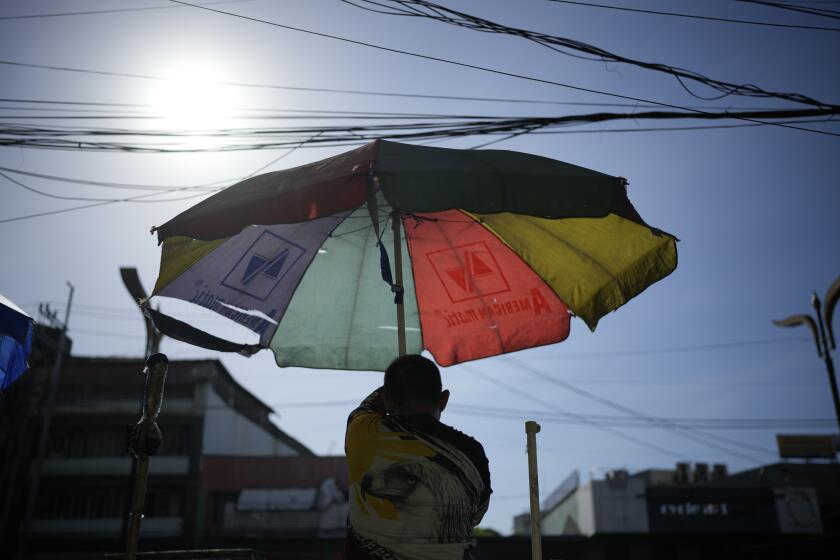U.S. Probes Cuban Deals by Noriega : Inquiry Reported on Alleged Illicit Computer Traffic
The U.S. Customs Service is investigating the alleged role of Panamanian strongman Manuel A. Noriega in the illegal shipment of American high-technology equipment through Panama to Cuba, sources familiar with the inquiry said Monday.
The investigation, now centered in the Tampa, Fla., area, marks the third major inquiry by federal agents into allegedly illegal activities by Noriega. It was disclosed earlier that the Drug Enforcement Administration in Miami and the FBI in Tampa are investigating Noriega for alleged drug trafficking and related money-laundering.
Spokesmen for the Customs Service declined to comment on the latest disclosure, but other government sources said that the high-technology items in the agency’s probe consist primarily of computer equipment. Although the items have no intrinsic military value, sources said, they could be applied to a wide range of military and scientific uses.
Payoffs Alleged
“Some of it is IBM PCs,” one source said, referring to personal computers made by International Business Machines Corp.
Another source said that “information has been developed showing that Noriega derives personal benefit” from the shipments, either through payoffs or his investment in Panamanian shipping companies. He estimated that the investigation, which involves documentary material as well as information from informants, will take four to six months to complete.
The investigations by the FBI, DEA and Customs Service are being conducted despite a split within the Reagan Administration about whether to press for the ouster of Noriega, commander of the Panama Defense Forces, the nation’s sole military and police organization.
U.S. Bases at Issue
CIA and Pentagon officials reportedly have argued that the fall of Noriega could endanger U.S. military bases in Panama. Even DEA officials have expressed reluctance about the case, noting that Noriega and his associates have supplied them with information about narcotics trafficking by persons who have fallen out with him.
Without the political ramifications, however, the Cuban case is a classic example of the type of high-technology flow to Soviet Bloc nations that the Reagan Administration has been trying to stop. In 1982, the Administration began an effort called Operation Exodus that placed new emphasis on stemming the sale of high-technology equipment and munitions to Communist Bloc countries and other potentially hostile nations, including Iran and Libya.
A Senate source with knowledge of the Customs Service inquiry contended that it shows greater promise of establishing criminal violations by Noriega than the drug and money-laundering cases.
Adolfo Arrocha, charge d’affaires for the Panamanian Embassy in Washington, said he had not been informed of the investigation. “I must confess that in all sincerity this is the first I have heard of this situation,” he said.
The high-technology material includes recent shipments and involves the falsification of paper work, including so-called end-user certificates, which are required documents that specify the customer to whom the equipment is being shipped, one source said.
The shipments were described as moving through the free-trade zone of Colon in Panama. “My understanding is that the stuff never leaves the airport” there and is simply transferred to Cuban-bound aircraft, a source said.
Last April, a Customs Service investigation in Miami resulted in the indictment of three men for allegedly selling more than $1 million worth of sophisticated computer equipment to Cuba in violation of the U.S. Trading With the Enemy Act.
“This should be the first of many cases like this down here,” Pat O’Brien, a Customs Service special agent in Miami, said at the time of the indictment, which resulted from Operation Exodus.
One source suggested that information developed during the Miami probe led to that pointing to Noriega, but no specifics of the link between the matters could be learned.
In addition to the three men, the Miami indictment also named Siboney International in Panama, described by a Customs Service investigator as “a Cuban government front company used to acquire technology articles.”
The material allegedly sold to Siboney included computers, computer chips and equipment for linking computer systems. It was described as “IBM compatible,” noteworthy because Soviet Bloc countries use the Ryad 1 and Ryad 3 computer systems, which are copies of IBM systems.
More to Read
Start your day right
Sign up for Essential California for news, features and recommendations from the L.A. Times and beyond in your inbox six days a week.
You may occasionally receive promotional content from the Los Angeles Times.






